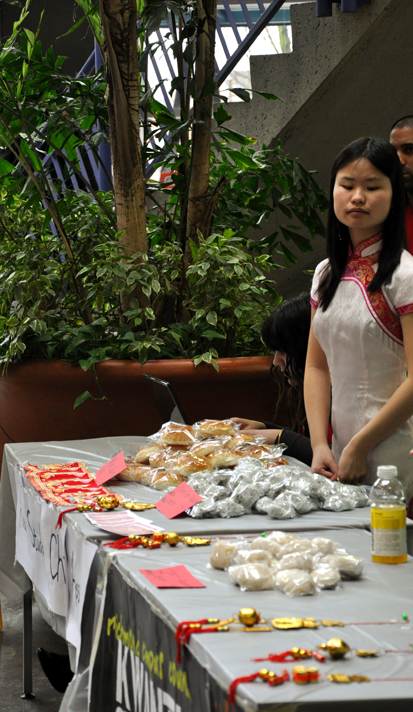Design program to show off its work this Thursday
April 12, 2011 by Max Hirtz · Leave a Comment
The Foundations in Design Certificate Program will be hosting a year-end gallery event on April 14.
Anyone can drop by for the public event, from 2-4 p.m. on the third floor of the Richmond Kwantlen campus in rooms 3010, 3020 and 3850.
A separate, invitation-only event will be held from 6-9 p.m. The evening event will include a raffle, with proceeds going to charity.
The gallery will feature everything created by the students in the one-year program, which is designed to give students a basic understanding of all types of design.
“Basically, it’s a broad, basic program that just introduces the students to the world of design, because there’s so many different directions that you can go,” said Dylan Seger, a student who has finished the program and who volunteered to be the coordinator for the event.
The goal for the event is to “open up people’s minds to the possibility of design,” he added.
There will be a wide range of styles on display, as there are over 30 students in the program.
Advancement office confident scholarship money will be matched
April 12, 2011 by Steven Maisey · Leave a Comment
The administration at Kwantlen Polytechnic University looks like it will be coming through with the necessary funding to contribute to the Family Campaign at Kwantlen.
According to advancement officer Katie Kinch, the administration hasn’t confirmed its intentions to match donations made by faculty and staff for the campaign, which raises money for student scholarships, but she said that she hasn’t received any indications that the donations won’t be matched by the university.
The Family Campaign is a program that allows faculty and staff to donate money for student scholarships and bursaries. The Family Campaign this year will fund 74 scholarships and awards.
“We raised $111,000 for 2010/2011,” Kinch said.
Kinch believes that with the administration continuing its involvement in the program that will encourage more staff and faculty to become involved, and that it will provide a strong incentive for members to continue to make contributions to the program.
This year, the program achieved a 12.3 per cent response from its faculty and staff, which accounts for 210 of the 1,670 total Kwantlen staff and volunteers.
“I would be very optimistic that we can reach a target of potentially $125,000 with matching staying in place as a really strong incentive for staff, faculty and administration, as well as our volunteer board, to continue to make regular contributions,” Kinch said.
Faculty are able to make contributions to awards in their own field of work and study, as well as create their own award if they prefer, which can be awarded to a student in the faculty of the volunteer. Kinch says that she has received numerous calls inquiring about that.
Even though the percentage of staff involved may seem small, Kinch said that she takes pride in the culture of giving at the school. Last year, the campaign was able to fund 50 awards and scholarships. That has risen to 74 this year, and Kinch said that is a direct result of an institution that is committed to student success.
“It really is a strong statement about the culture here at Kwantlen,” Kinch said. “Talking about really being accessible and supportive and having an institution that is really committed to student success, the fact that there are significant dollars and awards behind that backs it up even further.”
The donation period for this year’s Family Campaign wrapped up on March 31.
Kwantlen students stand up for animals
April 12, 2011 by Matt Law · Leave a Comment
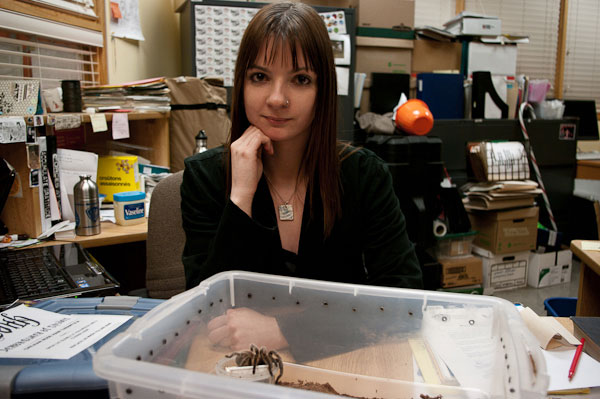
Kari Michaels, founder of the Kwantlen Animal Rights Collective, is fighting for animals big and small — even her Chilean Rose tarantula named Lolth. (Photo by Kyle Benning)
Students at Kwantlen Polytechnic University are standing up for the rights of animals, from eight-legged tarantulas to cud-chewing cows.
The Animal Rights Collective club was started in 2010 after founder Kari Michaels saw a need for a way to connect like-minded students. Her goal: bring attention to the mistreatment of all animals, big or small.
“I think a big thing is knowing there are people out there that think the same way, especially with animal rights,” said Michaels.
Michaels had always cared for animals but it wasn’t until she found out that she was allergic to dairy and eggs that she decided to take that next step in animal activism and become a vegan. This lifestyle change led her to lean a lot about how farm animals are treated.
“It was a very strong wake-up call to advocate for the better treatment of animals,” she said.
Her transition to a complete vegan has not been an easy one and the support of a group is what has helped keep her from cheating with her favourite foods, nachos being her latest indiscretion.
“I thought there must be people here who feel the same way but just don’t have a community, so part of it is community building, which I think is really important, not only to help with resources but it also helps with support,” said Michaels.
The Animal Rights Collective isn’t just for vegans. It’s for anyone who cares about the ethical treatment of animals.
“As long as you don’t think it’s okay to kick a puppy, you’re in,” Michaels said.
While Michaels’ focus is on the treatment of farm animals, the club brings attention to all animal rights issues, such as puppy and cat mills, as well as product testing on animals.
For Michaels, advocating for animal rights isn’t more important than any of the other serious issues facing the world.
“There are so many other issues in the world that are important, there are human rights, womens rights, but a lot of people don’t understand that when you care about animal rights it’s part of that scope, you’re just extending that scope of compassion to include non-human beings,” she said.
Michaels said it isn’t the goal of the club to force other students to change, but to promote thought and discussion. She also hopes to bring more vegan-friendly options to the Kwantlen campuses.
For more information on the Animal Rights Collective, contact the club by email
Clubs night a qualified success
April 12, 2011 by Matthew DiMera · Leave a Comment
More than a dozen clubs filled the Grassroots cafe in Surrey, recruiting new members at the KSA’s inaugural clubs night on March 3.
Thirteen out of the 33 clubs and recognized groups listed on the KSA website signed up to be part of the initiative to generate more interest in student clubs.
Laura Anderson, acting clubs and event coordinator for the KSA, has been frustrated by the lack of campus life at Kwantlen for years. Now studying at Simon Fraser University, she thought more could be done to emulate the success of clubs at UBC and SFU.
“The whole thing was to try and get clubs more active on campus and increase not only their activity, but their membership and student activity,” said Anderson.
Before becoming a staff member, Anderson held various elected positions in the KSA, including stints as director of external affairs and chairperson.
Sociology club member Faith Chern attended the event and was optimistic about its success.
“I thought it was good, better than what I expected,” said Chern. “We’re just starting up trying to become an established club.”
Although it’s just getting off the ground, the sociology club eventually hopes to host events, guest speakers and a lecture series. The club had 11 members, but managed to sign up 15 interested students over the evening.
“I personally hope it becomes a regular event, because students should be more involved in clubs on campus,” said Anderson. “It’s an important part of student life.”
Criminology club to make a comeback
March 9, 2011 by Jocelyn Gollner · Leave a Comment
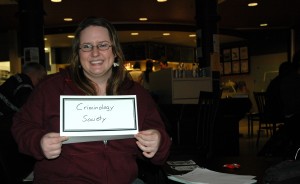
Leah Godin sits at Kwantlen's Club Night on March 3. She is in the process of starting up the Kwantlen Student Society.
Leah Godin, a third-year criminology student, is in the process of making the Criminology Student Society a reality again.
Up until last year, there was a Kwantlen Criminology Club, but according to Godin, the club dissolved after the club’s president graduated and no one took over the role.
Now Godin is encouraged and excited to bring it back to Kwantlen. But this time as a society, instead of a club. One of her instructors just thought it sounded better that way.
“I’ve announced it to a few of my classes, and I’m getting the instructors to tell their classes,” Godin said. “There are a bunch of people who are really excited about doing it, so it’s just the initial bit. You need to get so many people to sign up, which isn’t that much really, it’s only like 10 members.”
Godin had about 10 people sign up at the Kwantlen Club Night alone, which was on March 3 at the Grassroots Cafe.
The society will start out with a general meeting to see what students want from the society. Then, once it’s up and running, there will be field trips, talks given by instructors from Kwantlen and other post-secondary institutions, movie nights, pub nights, discussion groups, as well as information on how students can get involved in their community.
This club is open to all Kwantlen students, not just criminology students.
“I don’t want to cut anyone out of an opportunity because they might actually realize that they really like criminology and maybe later major in it,” Godin said.
It’s clear that Godin is passionate about starting up the Criminology Student Society.
“For some reason, this semester I’ve been getting really involved with what’s going on around campus,” Godin said. “The possibilities are endless, and I just feel that all Kwantlen students should be able to embrace what’s out there and what’s available.”
If you’re interested in joining the Criminology Student Society, email Godin.
Cuban exchange teaches more than academics
February 27, 2011 by Jeffrey Yip · Leave a Comment
Alexis Wiessler believes we have a lot to learn from Cuba.
Wiessler, a horticultural student, was one of six students who went to Cuba in October 2010, through an exchange program with the Institute for Sustainable Horticulture, to participate in field research at the University of Sancti Spiritus.
“I just thought going to Cuba and seeing how they do things would be really beneficial to my career further down the road,” she said.
Cuba is a leader in sustainable farming practices, which is using more environmentally friendly techniques to grow crops. Wiessler and some of her colleagues worked on a project using a fungus to fight different plant diseases. They also used plants to attract insects that are natural enemies of other insects that are harmful to crops.
Overall, she believed the research went well, but they did have some problems.
“There were always pigs and goats and turkeys in the fields eating everything,” she said.
For the 26-year-old, the exchange became more than just about sustainable farming. While she knew living in Cuba would be difficult, nothing could have prepared her for just how different things would be. Cramped living quarters and little variety of food were just a couple of the challenges she faced.
It was her brief glimpse into the lives of everyday Cubans that Wiessler will remember most. She said that despite the hardships the Cubans faced every day, they are still a happy, friendly people who appreciate what little they do have.
“It was really refreshing to see people who have so little just not being affected by it that much,” she said.
The biggest challenge for Wiessler was living in a socialist country. She said things we take for granted, such as freedom of speech, don’t happen in Cuba.
“It was kind of scary at times, because we didn’t really know if we were overstepping any bounds,” she said.
As difficult as the exchange was at times, Wiessler doesn’t regret going and encourages other students to go on similar exchanges and keep an open mind about new experiences.
“I always knew we were lucky in North America, but it’s totally a different thing living in another country and really see how lucky we are,” she said. “As hard as it was, I miss it a lot. I started to get really comfortable there.”
Students air their feelings about stress
February 27, 2011 by Stu Gallacher · Leave a Comment
It’s that time of the semester when papers and mid terms start to pile up — and there’s no shortage of grievances to go along with them.
The academic system isn’t perfect and venting is a good way to release stress. Kwantlen students were asked what they find most frustrating about school.
Just Tillyer, 21, who studies psychology, said that he’d like to see more short- and long-answer tests, instead of multiple choice quizzes.
“It would be nice if there was more opportunity in terms of testing where students were expected to explain things,” said Tillyer.
Tillyer said he prefers written exams, so he can demonstrate in depth his grasp of the material.
Kim Blik, 22, who is in general studies, said mid-terms are her biggest stress. “Having [several] mid-terms on the same day is really stressful…and balancing work with school to pay the bills,” said Blik.
Students have different ways of coping with the stresses of school, finding some things more frustrating than others.
“Some profs hand out work that’s irrelevant to the classes. Some of the workload is just too much. Other than that, there’s nothing about school I really find bothersome. It’s just time consuming,” said Amar Badh, 19, who’s in general sciences.
Shane Kubeska, 21, who studies criminology, said he gets frustrated when teachers put emphasis on parts of the course that don’t appear on the exam. “Whatever is emphasized most on the exam should be emphasized in the lectures, so we know what to study.”
Kubeska said that he studies all the notes from class, but when there’s so much to cover, teachers should point out what the most important material is.
GDMA student uses her Kwantlen education at national paper
February 17, 2011 by Kyle Benning · Leave a Comment

Cat Yelizarov with some of her school work. Yelizarov thinks that being a student is more stressful than working at a national paper. (Photo by Kyle Benning)
Cat Yelizarov spent her past summer as few other university student did: working in the stress-filled environment of a newsroom.
The fourth-year GDMA (Graphic Design for Marketing) student at Kwantlen spent the summer completed her internship at the Globe and Mail newspaper in Toronto.
Yelizarov went into her internship with only a little journalism experience, from working with The Runner, the student-run newspaper at Kwantlen.
Yelizarov said going to Toronto by herself to work as an intern was difficult and scary.
“It was different because I came with no journalism background, so I had no experience and I was really scared, and every day I thought I was going to get fired because I thought I sucked,” Yelizarov said.
In Toronto, Yelizarov was thrown straight into designing for the Globe and Mail. She was given two days of training and then she was designing section fronts.
What made her experience even more stressful was the Globe and Mail was in the process of redesigning the newspaper while she was there. Yelizarov was in charge of designing multiple section fronts each day, as more experienced designers were helping out with the redesign or on vacation.
Yelizarov ended up designing a front for every section of the Globe and Mail during her time there, except for the Report on Business section. She said her time there was stressful, but still thinks school is more pressure packed then working.
“I think it’s way more stressful being in school than working for a national newspaper. There is way more pressure,” Yelizarov said. “It’s weird because you’re responsible for designing, and the [printing] plates cost so much, like $1,000 per front, and if you fuck it up that’s like thousands of dollars down the drain because they have to fix it.”
But at university, she said that the pressure of getting good grades and peer pressure is worse.
Working under pressure is something Yelizarov thinks she does well, and that helped her keep focused, even with daily deadlines — and when mistakes were made.
“I spelled the person’s name wrong for a Saturday front which is horrible. So horrible,” Yelizarov said.
Dealing with mistakes and the pressure of deadlines wasn’t even the most challenging thing Yelizarov faced during her time at the Globe and Mail. It was some of the people she had to deal with.
The Globe and Mail is unionized and she says that while many people she worked with were cooperative and good-natured, others were there because of the pay and were bitter.
“You have to deal with people that would duck when they see the section editor because they didn’t want to talk to them. They would avoid them. You have a deadline at four and you’re avoiding the section editor, so it was complete chaos,” Yelizarov said.
With graduation and a wedding coming up, and the need to find a job, Yelizarov looks to be just as stressed as she was last summer. But after her experience at the Globe and Mail, she feels like she can accomplish anything.

Yelizarov's final project was her redesign of the R View newspaper. She redesigned the paper last year and set up a template for them to use. (Photo by Kyle Benning)
Environmental film night promotes living chemical-free
February 15, 2011 by Miranda Gathercole · 2 Comments
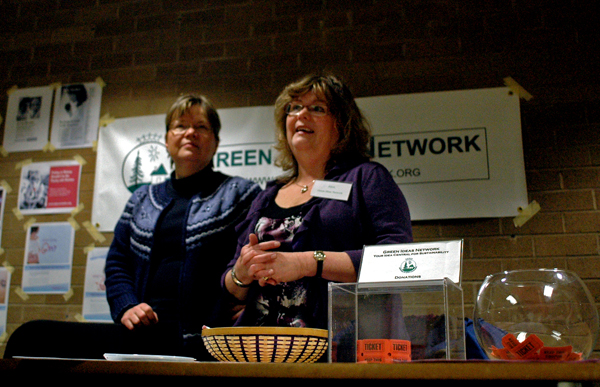
Sisters Doreen Dewell and Joyce Rostron form the Green Ideas Network, a non-profit organization aimed at creating healthier communities. They, along with Gary Jones, are the main organizers for Green Wednesdays. (Photo by Lucas Meneses-Skoda)
Saving the environment could be as easy as cleaning out the cupboard under the kitchen sink.
According to the Canadian documentary “Chemerical,” North Americans are poisoning themselves every day through the use of toxic chemicals in their households.
The documentary was shown last week as part of the monthly series, Green Wednesdays, held at the Kwantlen Langley campus on the second second Wednesday of every month. It follows the story of a family attempting to live chemical-free for 90 days.
The environmentally themed evening, hosted by Kwantlen’s School of Horticulture and the Green Ideas Network, is designed to show solution-based films to students and the general public about current environmental issues.
“The whole point of the Green Wednesdays is to give people some exposure to some of the kinds of issues around sustainability and the environment and our personal footprints on the planet, on whatever topic it happens to be,” said Gary Jones, horticulture instructor and event organizer.
In the documentary, there are many funny and emotional moments as the Goode family quickly realizes how dependent they are on chemicals in their home. According to the film, the average household has more than 40 toxic items that contain dozens of harmful chemicals known to contribute to health problems, including sterilization and cancer. The film suggests that this is directly related to studies showing that women who stay at home have a risk of cancer 43 per cent higher than those who work outside the home.
Products such as laundry detergent, window cleaner and even deodorant and cosmetics expose people to chemicals including trichlosan (a known carcinogen used in antibacterial products,) chlorine ( the number one toxic chemical in the home, used in bleach) and ammonia (used in cleaners) on a daily basis.
“I always try and buy green products, and it’s surprising just knowing that everyday products are pretty dangerous,” said Rachel Sproule, a first-time attendee to Green Wednesdays. “How are all of these products allowed on the market without any sort of warnings?”
Andrew Nisker, director of “Chemerical,” explores loopholes in the regulation system of the cleaner and cosmetic industries. Companies avoid labelling many ingredients in their products to protect “trade secrets.” Nisker reported on a study of 33 different brands of red lipstick that found 61 per cent of them to contain lead.
“If you can’t eat it, then you shouldn’t be putting it on your skin,” said an owner of a natural product company also showcased in the film.
Jones says that the point of showing these films is not to depress people, but to educate them and motivate them to make changes.
“It’s not just come here, listen to a movie about how there is going to be no oil here in 10 years time, go home and slash your wrists kind of deal. I like people to go home inspired enough to go find out about the subject and make their own informed decisions on what they are looking in to.”
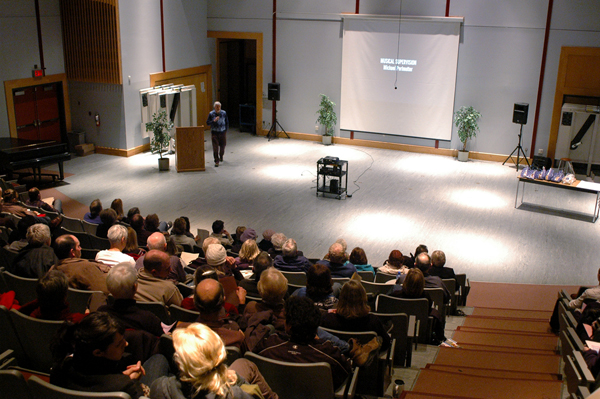
The fifth installment this year of Green Wednesdays was held in the auditorium on the Langley campus. The night was presented by Kwantlen's School of Horticulture and the Green Ideas Network, who work together to put on the eco-friendly movie nights once a month. (Photo by Lucas Meneses-Skoda).
Nichole Marples, executive director of the Langley Environmental Partners Society (LEPS) says “It all comes down to awareness. People saying, ‘Oh gee, I never thought of that before.’ I think these Green Wednesdays are awesome because they open the conversation, get people thinking about, ‘Oh gee, maybe that’s not the greatest thing’ or, ‘Oh, I’ve been using this for years and I didn’t actually understand it.’”
Jones says it is important that people begin to pay attention to the effects they are having on the earth and to make conscious decisions to change their habits.
“It’s life and death. How more important could it be? There’s some scary stuff out there, and we don’t know half of it. We have no idea. That’s what’s really scary, that we think we’re in control, but we have no clue really,” he said.
Joyce Rostron, vice-president of the Green Ideas Network, shares the same ideals.
“I do this for my children. They will really look to the future with open eyes. They won’t be so closed-minded about things,” she said.
Jones adds, “People come [to Green Wednesdays] for all sorts of reasons. My hope is that they go away a little bit more educated about some of these things. They’re not going to know everything about the topic, but if they can go away and get really interested they might go and do their own bit of research. Who knows?”
Year of the rabbit emotional time for Chinese student group leader
February 7, 2011 by Lucas Meneses-Skoda · Leave a Comment

Elaine Wang wears the colour red, a symbol of luck, for her mother who was born in year of the rabbit. Photo by Miranda Gathercole.
For one Kwantlen student, welcoming the Year of the Rabbit was emotional in a different way than usual.
Elaine Wang, president of the Chinese Student Association, celebrated the most important Chinese festival away from her family for the first time in her life.
“It makes me want to cry,” she said. “I got up earlier and [Skyped] with my family and we count down together.”
Wang immigrated to Canada less than a year and a half ago to study at Kwantlen, while living with her uncle in Richmond.
For Wang, this Chinese New Year spent away from family in China marked an opportunity to work with the KSA and open up Chinese culture to the students of Kwantlen. Wang says that it is also a way to bring a sense of community to other Chinese students who might be missing family back in China.
“Kwantlen is just like a home for us… Kwantlen is big family for us. So, we want the students to feel less lonely,” she said. “They are not alone, they are with us… we are all family members in continent.”
The group set up tables and handed out pork buns and sweet treats, traditional Chinese delicacies which are often eaten in the celebration of the New Year, to students at the Richmond, Surrey and Langley campuses on Feb. 3.
“We tried to choose items that would respect the traditional Chinese New Year aspect of it and something that all students could eat and try,” said Reena Bali, director of events and student life for the KSA.
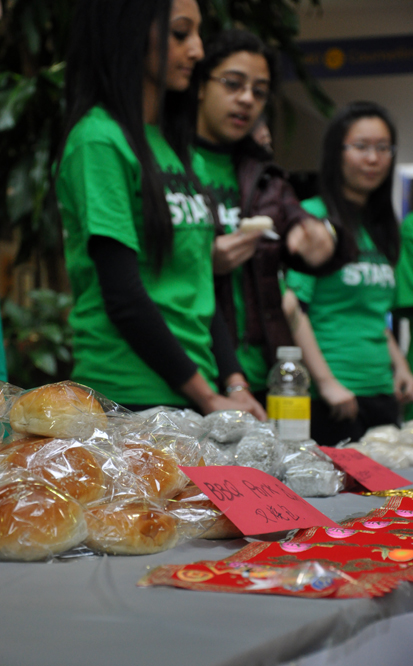
Lesha Ghirra, left, and Sarah El Bakkouri volunteer with the KSA to hand out BBQ pork buns, green tea-flavoured desserts and peanut-flavoured desserts to Kwantlen students at the Richmond campus. Photo by Miranda Gathercole.
Although Wang is happy to spend the celebration of the Year of the Rabbit in Vancouver with her friends and her uncle, it is difficult for her to be without her parents at a time that is “just like Christmas in Canada.”
“Yesterday, I even worked last night. I work at a restaurant and I see a lot of families who are immigrants. They get together and they celebrated… and the parents gave children red envelopes. I felt so sad because I was all alone here.”
In China, red envelopes, which usually contain money, are given by elders to children and family members to represent good fortune to come in the New Year.
“My grandfather said ‘I will keep the red envelope for you. If you go back China, I will give you,’ so it make me very happy,” she said.


